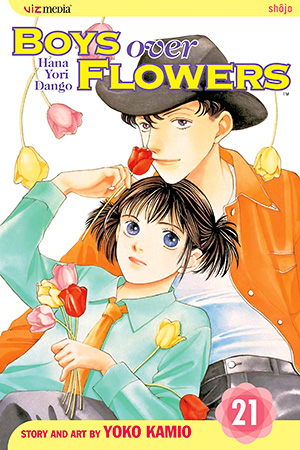This Week
Boys Over Flowers vol. 21
Dengeki Daisy vol. 14
A Devil and Her Love Song vol. 13 (conclusion!)
Fairy Cube vol. 1
There’s been one kind of curious consistency across the worst of the worst I’ve looked at – the tendency to declare the abusive boyfriends, “gentle.” This never made sense to me – how can you call someone gentle right after he slapped you across the face? “Gentle” is a way of behaving and treating others, not some innate quality. It is the antonym of “rough”, which is how one would describe a man who shouts and hits. After seeing it come up again and again, I figured it must be a quirk of translation. Sometimes a particular way of translating a word or phrase becomes standard practice, even if it doesn’t totally make sense in English.
For answers, I turned to my friend Chiaki, who speaks Japanese and English, both at a native level. As I suspected, it came from how the translator chose to interpret “やさしい”. As with most Japanese words, there isn’t a single one-to-one equivalent in English, but a variety of context-dependent choices. We agreed that the more accurate choice in these situations would be “kind”, which connotes something more integral to a person’s being than “gentle”.
There are still problems with these characters being described as “kind”. It’s a way of excusing violent behavior; if they’re kind deep down, it doesn’t matter how they act. It’s bullshit of course, like news outlets describing a mass shooter as someone who helped old ladies cross the street. There’s nothing kind about someone who goes out of their way to hurt people. But at least that translation makes sense.

Boys Over Flowers vol. 21
Tsukasa’s mother, Kaede, is back! Can Tsukushi really stay in the home of the woman with whom she is at war?! Kaede takes a new and vicious tack in her obsession to tear Tsukushi away from her upper class son. If Tsukushi can’t be bribed, then maybe Kaede can destroy the lives of Tsukushi’s friends! Tsukushi is forced to take extreme measures–but what course will she choose?! (summary by Viz)
0 points
What’s this? A Boys Over Flowers volume with zero points? I do declare, I may have the vapors!
Or not. As I’ve mentioned before, point counts tend to drop in volumes where the source of tension is external, rather than something within the relationship. It makes sense – you have to have a conflict coming from somewhere. In the face of a common enemy, the two people in the couple can find a united purpose instead of bickering and infighting. That’s been the case consistently in most of the series I’ve read, particularly series like Boys Over Flowers, Black Bird, and Dengeki Daisy. It’s probably also a factor in why I tend to favor stories that have romance, but not as the primary focus.
Domyoji briefly considers moving out of his mother’s home before Tsukushi convinces him not to; honestly, I’m a little disappointed we didn’t get to go that route. Watching the spoiled brat fumble around, trying to figure out things like rent and budgeting and grocery shopping – the kind of thing he looks down on peasants for doing – would have actually been pretty fun. Not having the ability to make his violent assaults just disappear by waving a wad of cash could get him into very deep trouble very fast. Then again, Tsukushi would probably have to take the brunt of his frustration and perform all the emotional labor of teaching him and apologizing for him. So maybe it’s for the best they didn’t go that route. But still, it’s nice to think about him having to face consequences for his actions…

Dengeki Daisy vol. 14
Teru and Kurosaki finally get ahold of “M’s Last Testament,” and they discover the truth behind their nemesis Akira’s past! While Teru opposes helping Akira with his current predicament, Kurosaki is forced to investigate further…with dire consequences for the both of them! (summary by Viz)
4 points
I realized something this volume that I probably should have noticed quite a while ago. Teru, the ostensible protagonist, has become less and less of an active character. As the conflict ramps up and the story becomes about the group of hackers saving Akira, Teru has less of a position in the narrative. She sits back and leaves it to Kurosaki and the other big strong men – Riko is ostensibly there but we mostly see her taking care of Teru. Teru, meanwhile, is stuck at home watching the puppy and stewing in an argument she and Kurosaki just had. Seriously. Kurosaki disappears without telling her anything, and their friend comes over and drops off his puppy with her.
There was one thing I liked about this volume. The conversation turns to whether or not Akira can be redeemed, and whether it’s worth stopping the plan to kill him. Teru, having suffered repeated physical and emotional violence at his hands, has no interest in saving him. Anime and manga tend to place a lot of emphasis on forgiveness, which I recognize is a cultural value. However, sometimes I feel like forgiveness is handed out too easily, or feelings of anger become treated as a personal flaw. The characters talk about Akira as if having a “mother” and “father” figure to nurture him can save him, but recognize that Teru will probably never be able to nurture him like a mother would. The whole concept is a huge can of worms, at least the others don’t try to force Teru to swallow her anger in order to save a boy who viciously abused her.

A Devil and Her Love Song vol 13
Maria’s boyfriend, Shin, is living abroad, and Maria is uncertain about their future together. With the end of high school fast approaching, she faces some tough decisions. Her friends encourage her to keep singing, but will Shin respond to this devil’s love song? (summary by Viz)
0 points
You almost lost me there, A Devil and Her Love Song, but you managed to turn it around and win me back over with a truly fantastic final volume.
Remember in the Black Bird commentary, how I regularly pointed out how the series romanticized the codependent relationship between Kyo and Misao? And how I hated that Misao had absolutely zero interiority beyond her longing for Kyo? The finale of A Devil and Her Love Song does the opposite of that. Maria misses Shin and seeks a connection with him – and screw him for deciding not to keep in touch, really – but she also finds joy and fulfillment through her hobbies and relationships with her friends while he’s gone. The series concludes with her deciding not to go to the US with Shin, declaring that she’s not going to move for her boyfriend when she’s just figured out what she wants to do, her head tilted defiantly in a mirror of her pose on the first volume’s cover. It’s a wonderful way to conclude Maria’s development from a lonely girl who struggled to connect to others to someone who loves and is loved in all her beautiful, awkward glory.
I’m all for setting off on your own and finding a new adventure in a new country, but that wouldn’t have been the case if she had gone with Shin. His parents are in the US and he speaks English fluently; had Maria followed him, she would be dependent and otherwise alone in a country where she doesn’t really speak the language. Considering the story’s themes of communication and platonic, familial, and romantic interpersonal bonds, that ending would have been a betrayal. As it is, Maria can retain those connections and continue to connect and communicate with others, while doing what she loves and staying true to herself.
Series Summary
Series total: 39 points
Average per volume: 3
Tropes: 3
Physical abuse: 1
Sexual abuse: 15
Emotional/Psychological abuse: 20
Most common:
- Touching without consent
- Namecalling/mocking/belittling
The vast, vast majority that A Devil and Her Love Song have garnered over the course of the series has been for little things, like Maria and Shin calling each other idiots. Most of the volumes got fairly low scores, with two incidents bringing in higher totals: the introduction of Shinichiro Kurosu and Shin nearly raping Maria in the piano room. Shinichiro’s entitlement to Maria’s attention and to her body was deeply grating, and I didn’t really feel like he deserved a place in the group, even after he toned it down. He played an important role in the narrative, reuniting Maria with her father, but overall he felt more like a device than anything else. And as for the latter incident… Well, I think it speaks for itself.
In the end, much of A Devil and Her Love Song is about the nature of forgiveness and redemption. In order to explore that subject, good characters do bad things. People who do bad things reform and realize the error of their ways. If someone put down the book when Shin assaulted Maria and never picked it back up again, I wouldn’t blame them. If I weren’t doing this project, I may have reacted the same way. However, Shin’s apologizes sincerely and understands what he did wrong, promising never to do it again. Compare that to Dawn of the Arcana, where Caesar never truly apologizes but or even really comes to a realization of how cruel he had been. I can’t dictate anyone’s feelings on whether or not Shin deserves Maria’s forgiveness, but A Devil and Her Love Song handles it far better than most other series.

Fairy Cube vol. 1
Ian and Rin used to just see spirits. Now Ian is one. Using the Fairy Cube, Ian must figure out how to stop the lizard-spirit Tokage from taking over his life and destroying any chance he has of resurrection.
Ian is transported to another world by the fairy Ainsel, who promises to help him stop Tokage upon their return to the human plane. (summary by Viz)
0 points
Fairy Cube looks to be something of an interesting beat. It’s a rare non-romantic shoujo manga with a male protagonist. The main character, Ian, has a girlfriend, but their relationship is not in the least the main focus. In this volume, in fact, it’s fairly incidental.
It is, however, wonderfully, gloriously Kaori Yuki. Yuki’s main claim to fame, at least as far as I can tell, is Angel Sanctuary, a popular series that ran in the 90’s with a an incestuous pair of twins at its center, surrounded by angels of pretty much every imaginable configuration of gender and sexuality. It was big, it was messy, it was problematic, and tended to sag under the weight of its huge cast and story, but it was ambitious and daring and different. Fairy Cube, at a brief three volumes, is probably going to be on a much smaller scale, but still very much Kaori Yuki. The human and the supernatural clash gorgeously and gorily as Yuki appropriates Western myth and mythology. Buckle up.
Next Week
Boys Over Flowers vol. 22
Dengeki Daisy vol. 15
Fairy Cube vol. 2
Hana-Kimi vol. 1

Hi! I always look forward to these posts and I notice it’s been almost a month since the last one. How’s it going?
LikeLike
Hi! Basically, I’ve started picking up more freelance work and have less time to work on these columns. Plus uh, some avoidance issues kicked in and I ended up returning a ton of books to the library without reading them. The project isn’t dead; I just have other priorities at the moment.
LikeLike